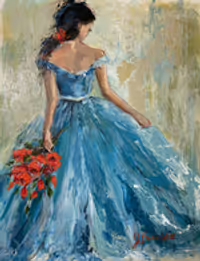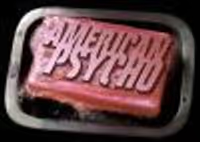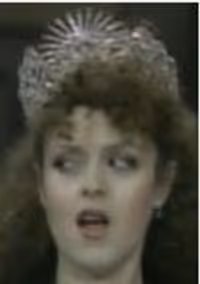BRIDGES in its final week
#175BRIDGES in its final week
Posted: 5/21/14 at 12:25pm
One of the comments in that article was "Call it American Chamber Opera, and put it in Lincoln Center, and the audience will understand it better"
I'm not saying a typical theatre-goer was too stupid to appreciate it on Broadway but .... I think it would have stayed open longer if it was at Lincoln Center for many reasons.
#176BRIDGES in its final week
Posted: 5/21/14 at 12:25pm
"I can understand the desire to only share ideas with the like-minded; but every thread on this site is an open forum for any point of view. Disagree if you like, just try not to turn it into a remake of Shirley Jackson's The Lottery."
I welcome differing opinions, when they matter. No one was shutting them down in previews/reviews or any other thread until now.
I'm not saying one can't share a differing opinion, I'm just more curious why anyone would feel the desire to do it at this specific time. Who was that negativity for? The show was closing, the people in the thread were all attending or reporting back on final shows....
It seems to have no purpose but provocation, to then lay the tracks for claims of victimization if it was successful.
#177BRIDGES in its final week
Posted: 5/21/14 at 12:29pm
"I just keep getting the vibe from people involved in the show and articles like this, that because Bridges did not have a pop or rock influenced score, it was somehow nobler than the shows that do."
I would certainly say it is more noble than using famous Carole King, Duke Ellington, or Disney movie songs, in terms of risk. But jukebox musicals can die a quick death if they suck, too. You just have one less obstacle in your path.
But, I never hear anyone bemoaning this as compared with If/Then, Gentleman's Guide, etc., which were also original. And, If/Then is definitely more contemporary sounding than Bridges. So, i think the argument is more original versus jukebox/rehash, not Golden Age vs. modern.
Updated On: 5/21/14 at 12:29 PM
#178BRIDGES in its final week
Posted: 5/21/14 at 12:33pm
But, I never hear anyone bemoaning this as compared with If/Then, Gentleman's Guide, etc., which were also original. And, If/Then is definitely more contemporary sounding than Bridges. So, i think the argument is more original versus jukebox/rehash, not Golden Age vs. modern.
See, now, I would be on board with that argument if the comments from people like O'Hara included a mention of original scores that might not quite fit into what she thinks of as being the sound of the Golden Age of Broadway. But she continues to say that there are only going to be revues/jukebox musicals, completely ignoring the fact that there are many shows (of varying success, admittedly) with original scores.
#179BRIDGES in its final week
Posted: 5/21/14 at 12:37pm
"I'm not saying a typical theatre-goer was too stupid to appreciate it on Broadway but .... I think it would have stayed open longer if it was at Lincoln Center for many reasons."
It's a musical based off of a best selling romance novel. It ain't James Joyce.
#180BRIDGES in its final week
Posted: 5/21/14 at 12:46pmDoesn't have to be, a Lincoln Center audience would have appreciated it and been more grateful for that gorgeous orchestra.
#181BRIDGES in its final week
Posted: 5/21/14 at 12:50pm
"See, now, I would be on board with that argument if the comments from people like O'Hara included a mention of original scores that might not quite fit into what she thinks of as being the sound of the Golden Age of Broadway. But she continues to say that there are only going to be revues/jukebox musicals, completely ignoring the fact that there are many shows (of varying success, admittedly) with original scores."
Well, I think she is speaking from a personal level, as someone whose voice is better suited to the Golden Age than a contemporary score. I don't know that she was critiquing the industry as much as her quotes were put into an article with that context, which makes them seem like support points for the reporter's thesis moreso than they might otherwise. Then again, interviewing her the day after her show closes is likely to skew her thoughts on these matters, as well.
#182BRIDGES in its final week
Posted: 5/21/14 at 1:00pmI also don't think I would identify the Bridges score as falling easily into the classification of "Golden Age;" it's much more folk/pop-influenced than that, and there isn't a single comic or true uptempo number in the score (with the possible exception of the country pastiche number "State Road 21").
#183BRIDGES in its final week
Posted: 5/21/14 at 1:03pm
"Doesn't have to be, a Lincoln Center audience would have appreciated it and been more grateful for that gorgeous orchestra."
A Lincoln Center audience would have been there because they subscribe to Lincoln Center.
#184BRIDGES in its final week
Posted: 5/21/14 at 1:10pm
That's weird because I'm not a subscriber and I, along with countless others, attend Lincoln Center....
"Well, I think she is speaking from a personal level, as someone whose voice is better suited to the Golden Age than a contemporary score."
I agree, Kelli doesn't have a modern voice and I hope she continues doing work that is suited to her voice for many years to come. She will be perfect for the King and I.
#185BRIDGES in its final week
Posted: 5/21/14 at 1:16pm
Lincoln Center has a built-in audience because of its subscriber base. It would have stayed open longer because of THAT, not because it was attracting a different crowd.
And I am doubtful that it would have attracted more people there anyway. It's a very large theatre and it's out of the general Times Square area. It lacks the nostalgia and recognition of South Pacific or the spectacle of War Horse or the critical hosannahs of Piazza.
#186BRIDGES in its final week
Posted: 5/21/14 at 1:19pmI thought that Kad's argument that it was based on a best-selling romance novel wasn't to say that it shouldn't be at Lincoln Center, but that it's not like it's based on an esoteric work that ONLY subscriber audiences would understand. It's based on a best-selling romance novel that was adapted into a major motion picture starring one of the leading film actresses in the world.
#187BRIDGES in its final week
Posted: 5/21/14 at 1:29pm^ That was indeed my argument.
#188BRIDGES in its final week
Posted: 5/21/14 at 1:29pm
I am thoroughly upset that Bridges has closed, but I understand why. The marketing team was terrible and it just wasn't pulling at the box office. It was up against way too many shows with bigger hype. I saw it twice and loved it each and every time. I thought it was something very beautiful and something very moving and it will forever be an experience that I'll hold dearly.
I do agree though that the article did glaze over Gentlemen's Guide and If/Then, however what I read was more so the author and O'Hara conveying that people appreciating music that stems from the Golden Age of theatre has begun to die down. And that's understandable, seeing that the world is changing. I can also speak from what I've noticed from my generation. This past year, my school put on Carousel. However, when it was first announed, people (minus myself) through a fit because it was "old" and the music wasn't current. People this day in age, if they're not regular theatregoers, don't want to sit down and appreciate something and process it. They want to hear music that is similar to their own taste. It's sad, but true. I'm considered weird in my theatre troupe because I listen to the Golden Age and never had any interest in Next to Normal or Spring Awakening. Sorry this is so long and probably doesn't make sense. I just wanted to throw my own two cents in.
#189BRIDGES in its final week
Posted: 5/21/14 at 1:31pmRight voice, I wasn't saying that, but it probably would have attracted a lot more than just their base.
#190BRIDGES in its final week
Posted: 5/21/14 at 1:35pmWhy would it attract more people at the Beaumont or the Newhouse than it would at the Schoenfeld? Why would the space make any difference in sales?
Steve721
Stand-by Joined: 2/21/14
#191BRIDGES in its final week
Posted: 5/21/14 at 1:38pm
"And I am doubtful that it would have attracted more people there anyway. It's a very large theatre and it's out of the general Times Square area. It lacks the nostalgia and recognition of South Pacific or the spectacle of War Horse or the critical hosannahs of Piazza."
Piazza didn't really receive "critical hosannahs"--Brantley called it "encouragingly ambitious and discouragingly unfulfilled". Moreover, Bridges is more accessible than Piazza, which is almost an opera. With its large subscription audience and non-profit status, Lincoln Center would almost certainly have given "Bridges" a longer run.
#192BRIDGES in its final week
Posted: 5/21/14 at 1:40pm^^^ Thanks Steve, I was writing something very similar to your last sentence, but I will just agree with you. Exactly.
#193BRIDGES in its final week
Posted: 5/21/14 at 1:46pm
Forgive me if the following doesn’t make much sense (still forming my thoughts on it all), but I agree that the “Bridges” score is not necessarily fitting with the scores of the Golden Age (although, in comparison to most scores on Broadway right now, it would lean closer to the Golden Age sound than most). But, for me, I don’t think it’s a difference of “Golden Age” vs. “Modern.” I think it’s more a comparison of “typical Broadway sound” vs. “pop/rock top 40 sound.” That is, while I agree that “Bridges” certainly has classical stylings/influences to it, it still does have some modern pop/folk influences to it (and, as has been pointed out, doesn’t include comedic or up-tempo numbers often found in scores of the Golden Age). However, the difference is that it does fulfill that sweeping, melodic style that is associated with Broadway that many of the newer, original scores these days don’t. To me, I think it’s a question of whether audiences want to hear new Broadway scores that have that “typical” Broadway sound or if, when attending new shows, audiences want to hear the new Broadway sound (those scores that are much more akin to the kinds of songs we can hear on the radio today). To put it simply, I see it as a difference of a melodic, sweeping ballad vs. a pop/rock based ballad with a driving feel to it.
Really interesting to read Kelli’s quotes in that article, though.
#194BRIDGES in its final week
Posted: 5/21/14 at 1:50pm
You can't say a commercial show would have done better as a non-profit subscription-heavy run. It's a totally different category with different parameters for success, not to mention that putting it up automatically guarantees filled seats.
But Sutton Ross dismissed the weight of Lincoln Center's subscriber base when I brought it up.
#195BRIDGES in its final week
Posted: 5/21/14 at 2:44pm
I'm not sure where people are getting that the Bridges score is comparable to "Golden Age" scores. While Kelli O'Hara and Steven Pasquale are most certainly legit singers, the score of Bridges takes most of its musical cues from '60s folk and pop music. That's actually one of the things I love most about JRB as a composer...the feel of his scores match the settings incredibly well.
I'm on my phone at the moment or I would type a longer response to the Hollywood Reporter article, but in general I think it's pretty incorrect and completely ignores the existence of shows that don't support the argument the author is trying to make.
Steve721
Stand-by Joined: 2/21/14
#196BRIDGES in its final week
Posted: 5/21/14 at 3:11pm
I have trouble believing that people passed on Bridges because of the style of the music--the score was not the problem with this show. In fact, I think the music actually drew people to it--that was certainly the case with me; I had no interest in seeing Bridges until I heard some of the songs.
IMHO what did the show in was a combination of these issues, which even an acclaimed score could not overcome:
(1) ineffective marketing;
(2) a lack of broader audience affinity with the source material, which proved to be beyond its shelf life--by comparison, for example, people will still flock to hear Carole King's iconic songs;
(3) mixed reviews, with the most of the criticism focusing on the book and the direction; and
(4) the absence of stars with drawing power--despite her glowing reviews, Kelli was not able to do for Bridges what Idina (with her legion of fanzels from Wicked and Frozen) has done for If/Then, which got worse reviews and which will almost certainly close as soon as Idina leaves.
#197BRIDGES in its final week
Posted: 5/21/14 at 5:33pm
"I'm not sure where people are getting that the Bridges score is comparable to "Golden Age" scores. While Kelli O'Hara and Steven Pasquale are most certainly legit singers, the score of Bridges takes most of its musical cues from '60s folk and pop music. That's actually one of the things I love most about JRB as a composer...the feel of his scores match the settings incredibly well."
It does have a range of styles. Many of Francesca's songs are what I think most people would typically describe as similar to "Golden Age" (e.g., To Build a Home; her contrasting lines in "Home Before You Know It"; What Do You Call a Man Like That; Almost Real; Always Better). What I really like about the score is that it directly contrasts the style of music that her husband/family sing, and that Robert sing. The score is just so thoughtful and it has been several years since I have been this excited about a score.
Regarding the article, although the state of Broadway is not as heavy of jukebox musicals as it might convey, I still think it's absolutely correct for Kelli to call out Jukebox musicals and other musicals that have pre-existing scores (e.g., Aladdin). Assuming that those who attend these shows would have seen a musical with an original score otherwise (which I will say upfront would not be complete true. However, I think we can agree that many people who attend Mamma Mia! and Aladdin would attend another musical if they weren't available), there is literally millions of $$$ being poured into them that could have been used to support musicals with original scores. Shows that would have actually given us a hat, where there never was a hat. Every successful jukebox musical is another nail in the coffin for the original score. Not that there is an easy way to change this - people do prefer what is familiar to them, so what can we do?
Steve721
Stand-by Joined: 2/21/14
#198BRIDGES in its final week
Posted: 5/21/14 at 6:11pm
"Every successful jukebox musical is another nail in the coffin for the original score. Not that there is an easy way to change this - people do prefer what is familiar to them, so what can we do?"
Is it really a zero-sum game? That is, if there were fewer jukebox musicals, would there automatically be more musicals with good original scores? And aren't revivals equally a problem?
Broadway musicals today are definitely a "niche" market. Long ago, when shows were also a source of popular music, the medium drew lots of talented composers who were willing to develop their craft for Broadway, but those days are gone and will never return.
I think shows with good original scores--like "Fun Home" and "Here Lies Love"--will always be able to find a place on Broadway or off-Broadway. But, if this year is any indication, it's not like there are lots of really good musicals with original scores languishing without a producer.
#199BRIDGES in its final week
Posted: 5/21/14 at 6:16pm
I completely disagree with that assessment, qolbinau. The success of one show has nothing to do with the demise of another, and I also don't think that jukebox musicals are hurting the form in any way. I would rather have a "jukebox musical" that does interesting things with the storytelling and is exciting in its presentation like American Idiot or Fela! than a mediocre musical with an original score like, say, The Addams Family. The two former shows, whether you personally care for them or not, took creative risks and used existing music to tell a story in a new way. And what about something like Once, which tells an existing story with existing music in an incredibly theatrical way that, for me, was one of the most exciting things I've seen on Broadway in the past 5 years? That's also a show that people flocked to and has been a commercial as well as critical success, and I'm pretty sure most people didn't know who the hell Steve Kazee and Cristin Milioti were when the show first began picking up steam.
If you want to rail against mediocrity, that's fine by me. Certainly there are some problems with the direction Broadway might be heading in, but I don't think those problems can be reduced to jukebox musical vs. original score or celebrity vs. non-celebrity or any other black-and-white argument. There isn't a formula for success, especially not on Broadway, and I could go into a million examples but I won't. But it's incredibly myopic and reductive to say that the money being poured into a show like Aladdin could be used to support an original score; it's not as though there's a giant pool of Broadway Money that everyone has to fight for. Producers and backers invest in shows they believe in or that they think will make them money or both, and there isn't any formula for that either. And if you want to cite Disney specifically they also supported the development of Peter and the Starcatcher which was incredibly inventive storytelling and which also featured no stars and, while based on a popular story, was still theatrical and challenging to the audience.
I also don't think the same audiences who flock to Mamma Mia! and The Lion King and Phantom are the same audiences that want to go see a Sondheim musical or a Jason Robert Brown musical. Maybe there's some overlap, I don't know, but it seems doubtful to me. They're shows that do completely different things. Maybe it's true that we've become more passive as audience members, but I also know that I've been a part of audiences on Broadway in recent years that have been extremely engaged and excited by difficult material. To boil it down to one thing or the other is, as I said, not looking at the big picture.
Videos







